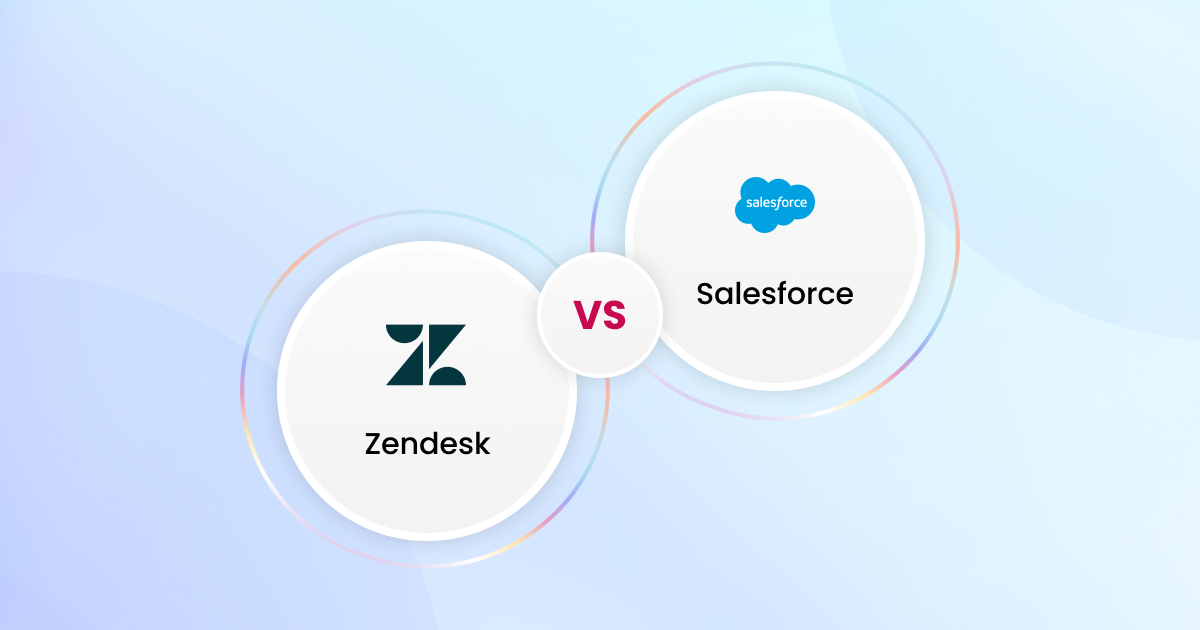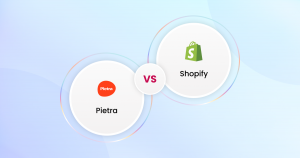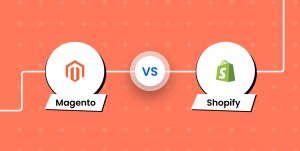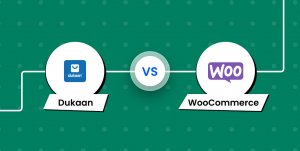Two good examples are Zendesk and Salesforce, which provide advanced CRMs along with other products that cater for all types of businesses. Zendesk offers the best user experience and is considered a good value for money, whereas Salesforce has a comprehensive set of features to address more sophisticated needs. This CRM comparison guide consists of an overview, strengths and weaknesses for both Zendesk vs Salesforce, and a consideration of factors when choosing the right CRM system for your organization.
Key Takeaway :
Zendesk and Salesforce are both leading CRM platforms, with Zendesk being a better value for smaller businesses or those prioritizing ease of use, while Salesforce offers more extensive features and customization for larger enterprises with more intricate needs. The decision between the two greatly depends on the size of a business and its specific CRM demands.
Understanding the Basics of CRM Software
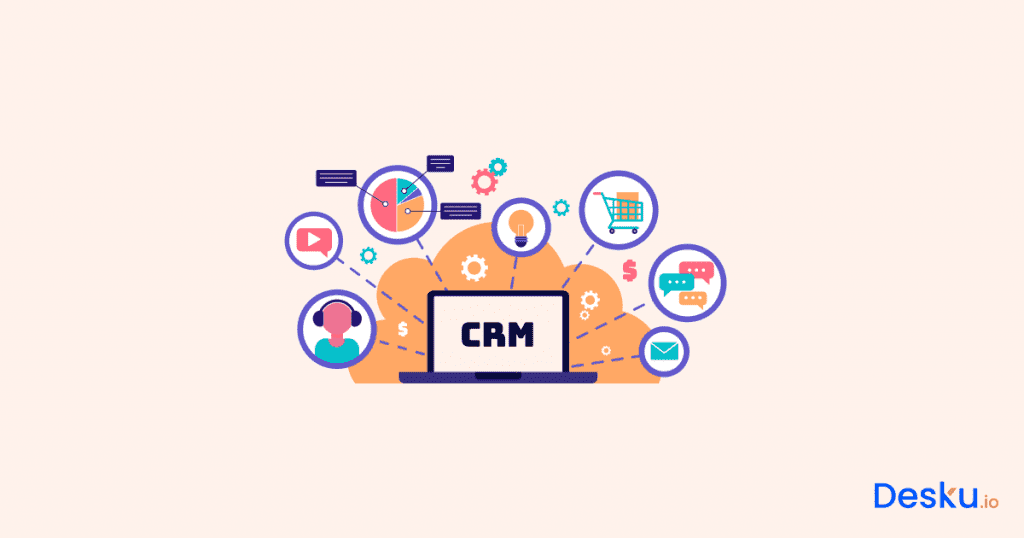
CRM Software-as-a-Service is essential for the efficient development of customer relationships, and sales and marketing strategies in businesses of all sizes. Platforms such as Zendesk and Salesforce have a broad selection of CRM tools to control sales pipelines, optimize customer interactions, as well as deliver configurable dashboards in one seamless platform.
With CRM software, businesses can become efficient at team operations, lead customer data and offer a view of the customer journey in a comprehensive form.
Key Features of an Effective CRM Solution
Different features and functionalities are considered when searching for the most appropriate CRM solution. Some of the most effective CRM features include:
- Automation: Utilization of AI-powered automations ensures that the workflows are optimised and team productivity is enhanced.
- Dynamic Workspaces: Such make teams work effectively and henceforth increase their sales community.
- Analytics Tools: It allows sales teams to gain exact information about sales performance, thus improving them in any respect required.
- Customizable Dashboards: Dashboard views can be customised to accommodate varied preferences and role-specific requirements.
- Integration Support: Third-party integrations play a big role in boosting the functionality and usability of any effective CRM solution.
In the end, the best CRM solution should be flexible enough to fit a company’s unique needs and allow it to control all customer interactions so that sales activities are contained within. By focusing on CRM features that support your particular business objectives, you can help to underpin your sales success and keep customers happy in today’s highly competitive market.
Zendesk vs Salesforce: A General Overview
Although, there are several CRM comparison examples provided especially in this case and Zendesk as well as Salesforce are leaders because they have the most complete sales and marketing tools that facilitate organizing one’s overall records for persons. Therefore, knowing the features of these two platforms, their integrations with other apps as well as pricing and user-friendliness elements is crucial in choosing a perfect CRM solution for your business.
- Zendesk avails its CRM services to over 200,000 global customers in an easy-to-use design. On the other hand, Salesforce which mostly competes with Zendesk is popular for its extensive customization options and support for numerous integrations.
- The CRMs support full contact and lead management, email tracking, sales forecasting and report generation.
- Useful features of Zendesk are its simplicity, sleek setup and more affordable model with simpler pricing than other cloud-based options so the product is very effective when used in cases for smaller businesses. On the other, larger organizations favour Salesforce due to its slightly advanced capabilities despite its higher costs and learning curve.
- Zendesk: Ease of use and affordable cost.
- Salesforce: Wide range of customization options and compatibility with many third-party systems.
From a feature perspective, both platforms offer major functionality like pipeline visibility, full reporting and analytics package and mobile applications. The tools are instrumental in improving sales effectiveness and customer aspects.
Zendesk and Salesforce both offer great help desk platforms, ensuring continuous client communication and seamless ticket management. Additionally, they offer flexible sales and customer service tools which can be customized to fit unique business needs especially regarding integrations with other software platforms and tools.
However, even though the two are similar in features, it is important for businesses to carefully analyze their needs before choosing either an on-site or cloud-based CRM as a preferred customer management platform because of fundamental differences in user experience and cost structure.
Comparing User Experience and Interface
In terms of CRM selection, ease of use is a key consideration since it has direct implications for team onboarding and productivity. When evaluating these customer support platforms in the competitive landscape of Zendesk and Salesforce, businesses should consider user experience and interface design.
Why Ease of Use Matters in CRM Selection
Having an intuitive CRM with modern design means users learn the platform quickly, and teams become proficient in no time through minimal training. Ultimately, this is beneficial in enhancing the quality of customer service since representatives can currently handle tasks and book appointments. Additionally, business is also saved for the fact that easy-to-use CRM does not require supplementary resources towards its implementation or usage.
Zendesk’s Intuitive Design and Usability
The user-centric design and responsive features of the Zendesk dashboard allow for efficient workflow. Useful onboarding guides, which are quick to read and easy to understand, take new users through key CRM building blocks like tasks, leads dates on the calendar and deals. Zendesk’s reputation in intuitive usability precedes them hence making it a suitable choice for businesses concerned with the user experience in their CRM selection.
Through its easy-to-use dashboard and simple layout, Zendesk is very quick to learn with minimal training.
Exploring Salesforce’s User Interface Complexities
Salesforce has a complex user interface, unlike the user-friendly interface for Zendesk. Over time, its design and user experience have not changed much; this may mean new users will take a longer time to learn. However, this interface is very complex and can overwhelm some users, making it difficult to manage Salesforce Sales Cloud and customize dashboards in line with specific organizational requirements.
Entailing enterprises to study the Salesforce platform to choose CRM user experience features may prove much more time-consuming as deploying the do-not-disturb mode and spam fighting appeared controversial. However, the Salesforce ecosystem is extensive and potent thus businesses must consider the possible extra expenses as well as the intricacy associated with its interface when selecting their CRM.
For the choice of Salesforce, it may present a steeper learning curve and needs more resources to be custom-tailored for use.
Feature Set and Functionalities
In comparing Zendesk and Salesforce, it’s important to consider the various capabilities associated with each platform in terms of features and functions. The CRM arena is very competitive, and the options are numerous with each presenting value in one way or another. To ascertain the most suitable for your entity, you ought to consider Zendesk’s CRM applicability alongside Salesforce features.
The Scope of Zendesk’s CRM Capabilities
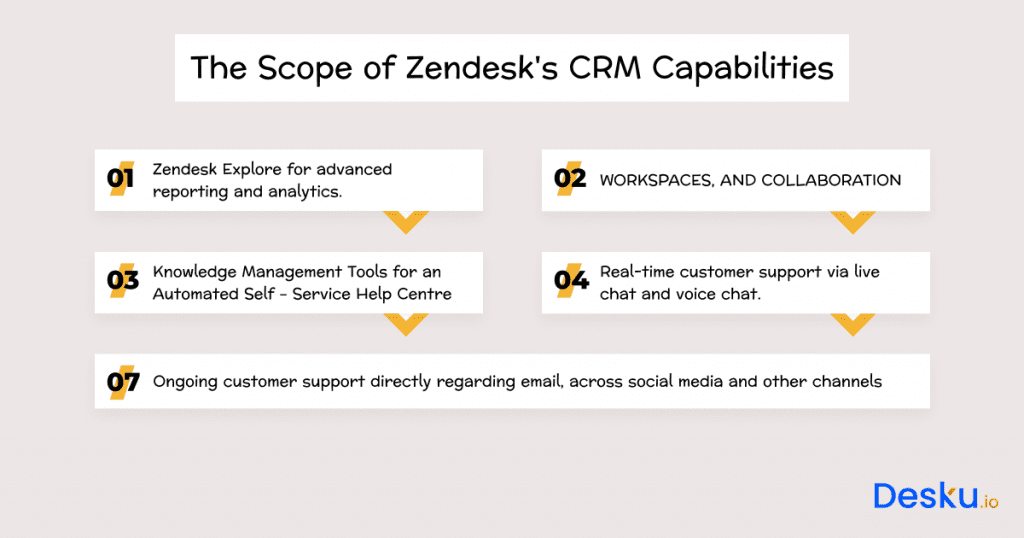
One of the most popular solutions for that is the Zendesk CRM package, the pledge to deliver us perfect customer service. Some key features that set Zendesk apart include:
- Ongoing customer support directly regarding email, across social media and other channels
- Knowledge Management Tools for an Automated Self–Service Help Centre.
- Real-time customer support via live chat and voice chat.
- Zendesk Explore for advanced reporting and analytics.
Zendesk Builds Cloud Infrastructure for Seamless Customer Experiences.
Such capabilities enable businesses to handle customer interactions more efficiently and provide a personalized, data-driven sales experience.
Assessing the Extensive Features of Salesforce
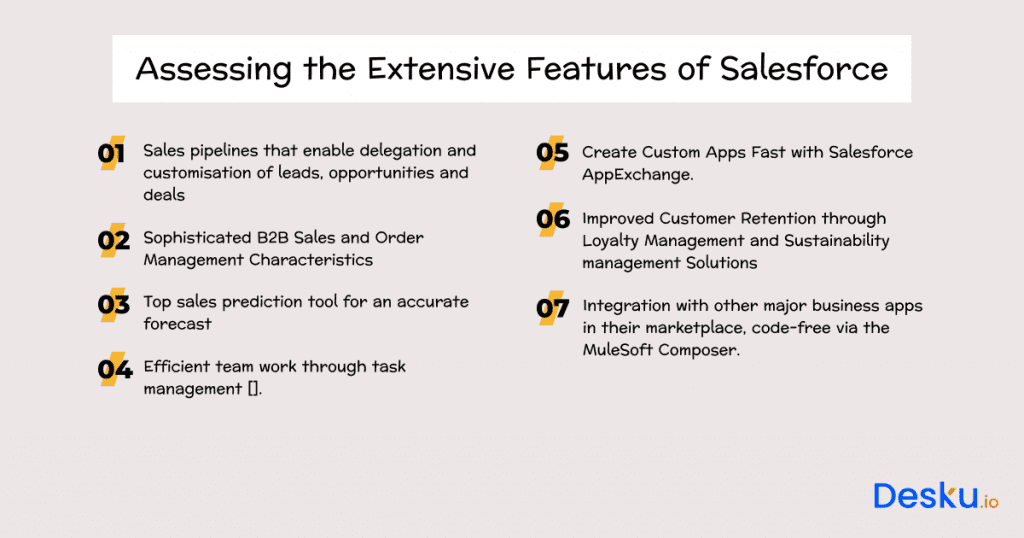
Salesforce, the CRM powerhouse sets itself apart with its broad spectrum of use cases and features that allow organizations to manage every key aspect of their sales and customer management efforts. Some notable Salesforce features include:
- Sales pipelines that enable delegation and customisation of leads, opportunities and deals
- Sophisticated B2B Sales and Order Management Characteristics
- Top sales prediction tool for an accurate forecast
- Efficient teamwork through task management [].
- Create Custom Apps Fast with Salesforce AppExchange.
- Improved Customer Retention through Loyalty Management and Sustainability Management Solutions
- Integration with other major business apps in their marketplace, code-free via the MuleSoft Composer.
Salesforce moved from a single CRM application to offer expanded customer relationship platforms, integrated with additional functions that support employees and suppliers.
Finally, in the evaluation process of CRM requirements for business, it is very important to understand that Zendesk and Salesforce have wide feature sets and functionalities. Attaining the best-suited CRM for your organization can enable firms to contribute to more knowledgeable, productive and customer-focused episodes that will eventually increase business performance.
Pricing Models: Which Offers Better Value?
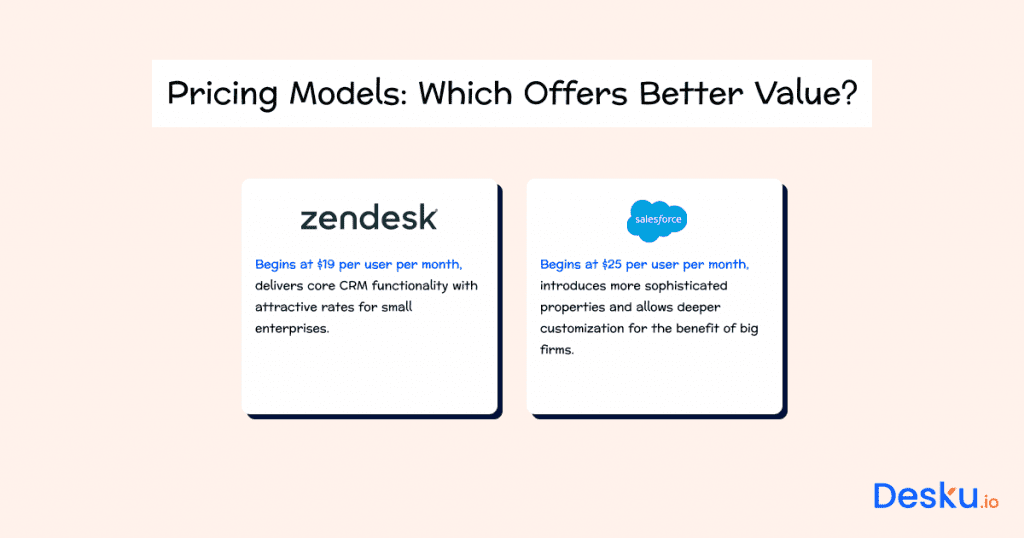
For that reason, when comparing CRM costs, it is important to analyse the worth of various pricing models from among top platforms like Zendesk and Salesforce. The aspects and functions supplied at each price level must also be taken into consideration for businesses.
Compared to Salesforce’s corresponding packages, Zendesk’s pricing model is generally seen as providing more value since there are some features offered even on lower pricing tiers.
Zendesk has a basic plan that goes for $19 each user per month and their competitive pricing is sufficient to provide a starting point for small businesses or struggling businesses. The plan comprises of vital CRM elements such as lead and contact management, customizable sales pipelines and basic reporting capacity.
Contrarily, Salesforce is more costly starting at $25 per user per month. Although the high price may deter some businesses, it is important to remember that Salesforce’s plans have built-in access to its advanced feature set, which appeals to big enterprises with more complicated needs.
Both Zendesk and Salesforce are value-based providers that provide multiple tiers which reflects the varying business sizes. That said, Zendesk’s pricing structure is more competitively priced and represents significant advantages to smaller businesses or those with less complicated CRM needs.
-Zendesk Pricing: Begins at $19 per user per month, and delivers core CRM functionality with attractive rates for small enterprises.
-Salesforce Pricing: Begins at $25 per user per month, introduces more sophisticated properties and allows deeper customization for the benefit of big firms.
Therefore, it can be concluded that the decision between Zendesk and Salesforce pricing models greatly depends on the size of a business and its specific CRM demands. For the most part, Zendesk looks like a better value, especially for smaller businesses or those that just want something simple to manage. On the other hand, Salesforce has higher pricing plans but provides sophisticated features and a complete toolkit for more sophisticated business organizations.
Sales and Marketing Tools Comparison
Other lead nurturing and generation tools can be found on both Zendesk and Salesforce that provide an extensive range of sales, and marketing. We shall, in this section, compare their abilities of lead management, sales dashboards and reporting features thus helping us evaluate how effective they are towards enabling predictable sales performance.
Lead Management in Zendesk and Salesforce
Zendesk, as well as Salesforce, offers strong lead and contact management features that help an organization to conduct accurate pipeline analysis and achieve predictable sales performance. Thus, Zendesk provides functions that facilitate easy customization and monitoring of active stages in the sales pipeline to manage contacts and leads at every stage of sales. On the other hand, Salesforce provides visual pipeline displays and enables them to set up alerts, dashboards as well reports that allows for greater visibility and control over their customers’ and leads’ activities.
The lead management features in the two platforms help to automate sales, thus founded on progressing customer interactions during sales.
Effectiveness of Sales Dashboards and Reporting
Both in Zendesk and Salesforce, reporting and analytics serve to assist sales people to track, measure, optimize business development activity effectively. Zendesk provides accurate forecast and pipeline analysis capabilities supported by the easily manipulative drag-and-drop widgets that enable users to produces custom insights and reports. This puts businesses in a position to be driven by data and make real time adjustments that enhances sales outcome.
Salesforce, on the other hand has its strong reporting features and broad dashboards which allow a user to track customer/lead activities. These are all important aspects to help develop and monitor performance goals, forecast pipeline analysis, and deploying advanced analytics tools that will support sales improvement. Salesforce has very sophisticated sales dashboards and reporting capable of giving a business important pointers as they continue to refine their sale strategies.
- The platforms are known for their effective user friendly and customizable sales dashboards and the tools for producing sales data.
- With the suit of drag-and-drop widgets, Zendesk provides a clear set of accurate forecasts and pipeline analysis.
- Salesforce provides sophisticated analytics tools and visualization for performance goal setting and sales strategy optimization.
Therefore, in summary, Zendesk and Salesforce are ideal sales and marketing tool providers for lead management, tracking of sales as well as contact handling that support the business. Their strong pipeline management, sales dashboards and reporting capabilities afford them the opportunity to retain stable sales effectiveness no matter what platform users opt for.
The Impact of Third-Party Integrations on Business Efficiency
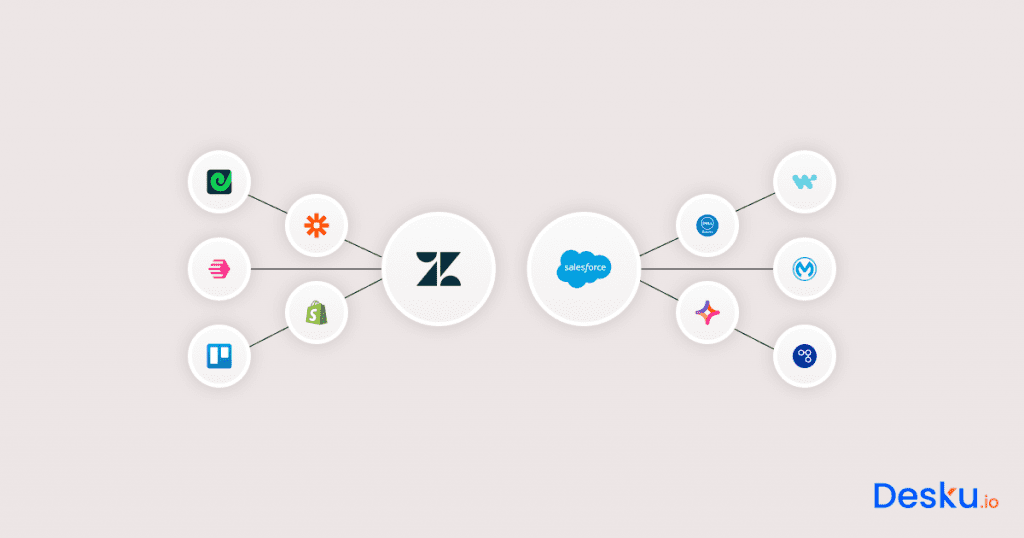
Third-party applications that are connectivity-capable with your CRM system also enable efficient business, such as sales and customer support. In this section, integration options by Zendesk and Salesforce are reviewed whereby it compares their large ecosystems that aid in customizing and enhancing workflows.
Evaluating Zendesk’s Integration Options
Zendesk supports a comprehensive list of more than 1,200 integrations that assist in connecting apps for analytics, sales activities and team collaboration. An example of such integration is the widely used automation app Zapier which automates tasks through a simple interface. Such broad support confirms Zendesk’s compatibility with various business workflows, and technology ecosystems thus allowing businesses uninterrupted access to any tool having a potential to enhance their efficiency.
Our integrations help streamline a company’s sales strategy by linking government partners, media and big data analytics to the customers.
Salesforce’s Vast Ecosystem of Integrations
The Salesforce ecosystem features over 2,500 app connections which goes to show that it is on another plane when saying of third-party integrations. MuleSoft Composer is one of the integrations that eases the development of complex feature sets. This extensive integration world indicates that Salesforce is keen to offer a flexible and customized space that can include various improvements and automation to the user workflow.
- Integration options move business phone service toward ‘virtual office’.
- Zapier integration for both platforms makes the automation tasks easier while being managed.
- Zendesk has over 1,200 integrations for personalizing the experience.
With over 2,500 connections in the Salesforce ecosystem, there are considerable third-party app integration options offered in this CRM which is a handy tool when it comes to customization and workflow enhancement.
In the end, Zendesk and Salesforce provide comprehensive third-party integration ability to augment corporate effectiveness. The enabling features of the platform with its necessary customizations are best created in Salesforce because of the vast ecosystem, while Zendesk is adaptable to a diverse range of business workflows mainly due to integration support. Thus, businesses should consider the integration needed to pick out a CRM platform that suits their needs.
Automation and AI: Advancing Customer Interaction
Zendesk and Salesforce recognized early the potential of automation and AI in enhancing the customer interaction experience. In associating with OpenAI and using sophisticated AI tools, these top CRM platforms seek to provide unified effective support and solutions for companies in various sectors.
Implementing advanced generative AI tools that facilitate auto prompt amongst other enhanced automations, the two are both at par with Zendesk having a slightly different partnership and little sophisticated tool.
In context of CRM automation, Zendesk and Salesforce have developed powerful tools that enhances customer experience. By using generative AI in such areas as customer inquiry handling, data analysis, and ticket management, these platforms help businesses respond to customers more effectively whilst minimizing workload for service teams.
Zendesk: Using AI to turbocharge customer service: Helpdesk, chatbots and others.
Salesforce: Applying Artificial Intelligence-powered insights, predictions and automation to support sales operations, customer relations and marketing activities.
Both platforms provide enterprise-level AI-powered tools, though a slight edge in AI sophistication goes to Salesforce. Built on their proprietary AI system, Salesforce Einstein, it offers advanced analytics and predictions in helping users understand customer needs and optimize their customer engagement strategies.
In a nutshell, the incorporation of automation and AI into CRM platforms like Zendesk and Salesforce has immensely enhanced interaction with customers that provides enterprises have to excel in today’s competitive market. selecting the appropriate platform depends on a meticulous review of AI capabilities of each and every both offering.
Customer Support and Service: A Critical Evaluation
Good customer support and service are basic in boosting the success rates of any organization; hence, it is inevitable to explore how various CRM solutions have approached that frontier to provide consistent support experiences. Zendesk Customer Support Features and Benefits in Seamless Service Experience.
Zendesk’s Approach to Customer Support Features
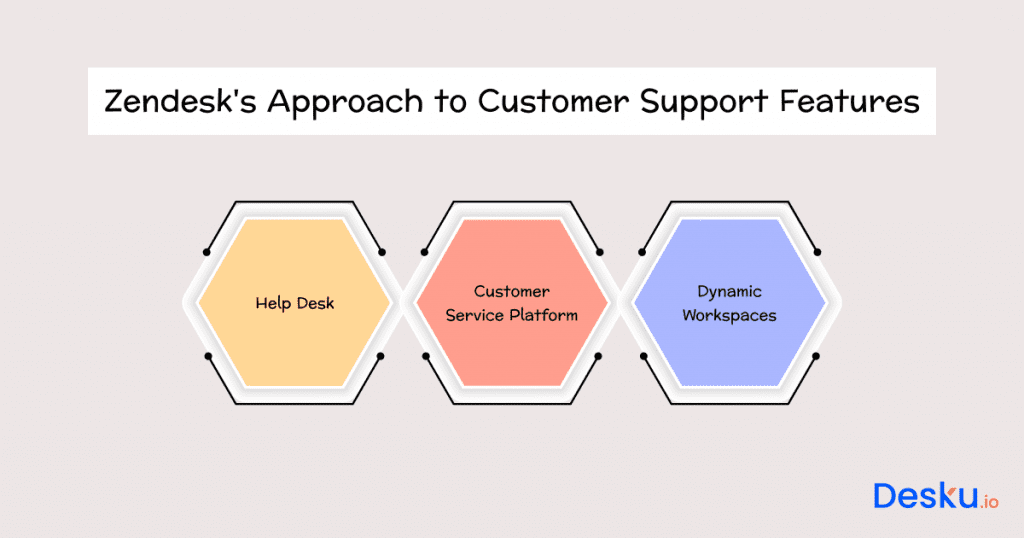
Our editors noted that Zendesk particularly stands for its full spectrum of customer support features such as support software, help desk functionality and ticket management. It is a powerful, flexible and efficient solution designed to achieve effective customer satisfaction on a user-friendly platform.
Zendesk is dedicated to providing the best and unified customer support experience.
One of the key elements in Zendesk’s customer support toolbox is the dynamic workspaces. With these customizable environments, support agents get a one-stop-buy of the essential tools and information required to solve customer inquiries promptly and competently. Additionally, dynamic workspaces enhance the effectiveness of teamwork by enabling on-the-go collaborations and efficient workflows.
Notably, the help desk software serves as an outlet through which market Zendesk’s customer support capabilities as all queries and service requests go through this centralized platform to ensure scheduled attention or action. It enables agents to easily follow up on tickets, rank and respond to them in order of priority so that no customer request goes unattended for long.
Help Desk: The help desk software from Zendesk improves the management of tickets and communication with customers.
Customer Service Platform: This facilitates the ease of handling customer inquiries and service requests more efficiently by the centralized platform.
Dynamic Workspaces: Customizable environments of support enable agents to work smarter, with contact centre workflows that become confidant and collaborative.
Zendesk’s contingent of customer support features intends to offer an integrated platform through which customers can interact with the company and give them a superior customer experience that echoes into their commitment towards customer satisfaction. Zendesk provides a robust support infrastructure that helps companies meet the needs of their customers hence creating lasting relationships based on trust and dependability.
Frequently Asked Questions
Q: What are the key differences between Zendesk and Salesforce?
A: IBM Lift integrates data from Salesforce, a famous CRM that provides sales, customer service and marketing solutions while Zendesk is mainly a customer support software with an emphasis on ticketing, self-service and team collaboration.
Q: Which platform is better for ticket management, Zendesk or Salesforce?
A: As an AI help solution, Zendesk has a powerful ticketing system with advanced functionalities such as comprehensive ticket management compared to Salesforce Service Cloud which also supports tickets but in most cases better integrated with sales and marketing.
Q: Can you explain the differences in reporting and analytics functionality between Zendesk and Salesforce?
A: Zendesk provides specialized customer support tables and service operations data structures centred on ticket, interaction, and team productivity metrics. On the other hand, Salesforce offers robust reporting and analytics throughout sales, service, and marketing processes to provide a comprehensive view of customer interactions.
Q: How does the workflow integration differ between Zendesk and Salesforce?
A: Zendesk provides also workflow automation mostly for support functions, such as ticket routing, escalation and resolution. Salesforce has sturdy workflow utilities in many business tasks, to enable sales and service automation and marketer improvement.
Q: Which platform offers better mobile app support, Zendesk or Salesforce?
A: Zendesk, like Salesforce, has mobile apps for on-the-go access and management. Aside from this, Zendesk’s mobile app is recognized for its easy-to-navigate customer support interface whereas Salesforce’s is an all-round sales, service and marketing offering.
Q: How do Zendesk and Salesforce differ in terms of customer relationship management (CRM) functionalities?
A: Salesforce is widely known for its strong CRM functionality; it provides a full set of solutions to manage customer interactions, sales processes and marketing campaigns. However, Zendesk is also a provider of CRM functionalities that concentrate on customer support and service operation.
Q: What are the key considerations when deciding between Zendesk and Salesforce for business needs?
A: For this reason, businesses should review their specific needs before choosing between Zendesk and Salesforce for the superior CRM capabilities, customer support software or a combination of both. In addition, the decision will be aided by considering factors such as team collaboration, reporting and integration capabilities.
Q: Can Zendesk be integrated with Salesforce, and if so, how does it enhance business operations?
A: Indeed, Zendesk integrates well with Salesforce to facilitate the transfer of data from customer support operations to CRM. It also improves customer interactions allowing for a complete view and uniform course of action towards customer management.
Q: What are the main advantages of using Salesforce over Zendesk for businesses?
A: With a plethora of products, elaborate reporting and analytical capabilities, and fully-fledged CRM functionalities Salesforce is second to none as far as marketers who are looking forward to undertaking sales or marketing functions are concerned. Its integration capabilities and support for mobile apps also increase productivity within a team.
Q: In what scenarios is Zendesk best suited for businesses compared to Salesforce?
A: It is the perfect solution for businesses that have customer support as a core function and need software with ticketing, self-service and team collaboration functionality. This is especially useful for companies that want to simplify customer interactions and provide a good customer interaction experience.
Conclusion
In terms of CRM selection, organizations need to recognize their particular requirements and consider the pros and cons of such platforms as Zendesk and Salesforce. With strong automation and the use of AI technology, both CRMs come with powerful capabilities; together they help to improve customer experience and make the customer journey easier.
With a simple interface, extensive features and competitive prices, Zendesk is an ideal choice for a lean-growing business. In contrast, Salesforce focuses on bigger businesses looking for advanced functionality and considerable platform customization that may be associated with higher costs.
In the end, the right option for any given firm will vary depending on factors such as company size, budget allocations and desired balance of user experience against feature complexity. Businesses can then make informed decisions that sufficiently cater to their specific CRM needs if they understand the differentiation points between Zendesk and Salesforce.




